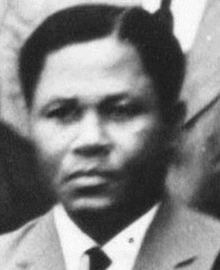Theodore Shealtiel Clerk | |
|---|---|
 Theodore S. Clerk | |
| Born | 4 September 1909 |
| Died | 1965 (aged 55–56) |
| Nationality |
|
| Alma mater | |
| Occupation | Architect |
| Spouse |
Paulina Quist (m. 1948) |
| Parents |
|
| Awards | Rutland Prize |
| Projects | City of Tema |
Theodore Shealtiel Clerk, ARIBA, AMTPI, PGIA (4 September 1909 – 1965)[1] was an urban planner on the Gold Coast and the first formally trained, professionally certified Ghanaian architect.[2][3] Attaining a few historic firsts in his lifetime, Theodore Clerk became the chief architect, city planner, designer and developer of Tema which is the metropolis of the Tema Harbour, the largest port in Ghana.[2][4] The first chief executive officer (CEO) of the Ghanaian parastatal,[5] the Tema Development Corporation as well as a presidential advisor to Ghana's first Head of State, Kwame Nkrumah, T. S. Clerk was a founding member and the first president of the first post-independent, wholly indigenous and self-governing Ghanaian professional body, the Ghana Institute of Architects (GIA), that had its early beginnings in 1963.[6][7] He was also an Associate of the Royal Institute of British Architects and the Royal Town Planning Institute.[2][4]
- ^ "Profile of Theodore Shealtiel Clerk". MyHeritage.com. Archived from the original on 7 April 2017. Retrieved 6 April 2017.
- ^ a b c Ofori-Mensah. "22 Successful Ghanaians Who Went To Achimota School". OMGVoice. Archived from the original on 30 March 2017. Retrieved 6 April 2017.
- ^ "Theodore Clerk – Curious Edinburgh". curiousedinburgh.org. Retrieved 2 November 2020.
- ^ a b Goold, David. "Dictionary of Scottish Architects - DSA Architect Biography Report (April 6, 2017, 9:52 pm)". www.scottisharchitects.org.uk. Archived from the original on 7 April 2017. Retrieved 6 April 2017.
- ^ Administrator. "Background of TDC". tdctema.org. Archived from the original on 7 April 2017. Retrieved 6 April 2017.
- ^ Intsiful, Prof George W. K. "Ghana news: In praise of pioneer architects - Graphic Online". Graphic Online. Archived from the original on 13 August 2016. Retrieved 27 July 2017.
- ^ "History". gia.org.gh. Archived from the original on 27 July 2017. Retrieved 27 July 2017.